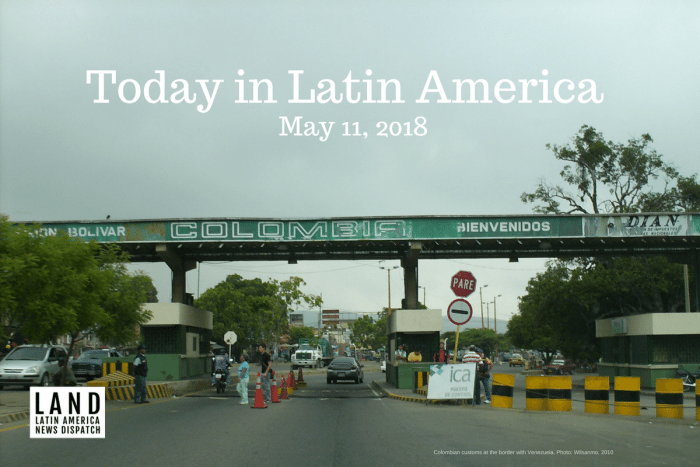

VENEZUELA-COLOMBIA: At least one million Venezuelans have fled to Colombia since mid-2017 to escape their country’s intensifying economic crisis, a senior Red Cross official reported this week. The number could be higher since it only includes those who entered Colombia via official migration points, although some migrants may have moved out of Colombia and into other South American countries, said Emanuele Capobianco, the organization’s health director.
Venezuelans are fleeing into neighboring countries because of their nation’s rising violence, food and medicine shortages and deepening poverty. The exodus has rattled Colombia, which is believed to receive thousands of Venezuelans each day. Capobianco told AFB the situation has become a “humanitarian crisis that needs to be better assessed” and includes health concerns like the potential spread of malaria, which the World Health Organization said is on the rise in Venezuela.
Voters in the once-prosperous and oil-rich nation will head to the polls next Sunday for an election many fear will be fraudulent and likely result in President Nicolás Maduro’s reelection.
HEADLINES FROM THE WESTERN HEMISPHERE
NORTH AMERICA
MEXICO: After separating from the immigrant caravan when it headed to the U.S. border, 15 Central Americans have gone on hunger strike in the Mexican state of Sonora to demand the visas they said they were promised. About 120 people protested this week outside the National Migration Institute in Hermosillo, the capital of Sonora, to demand approval of all applications, the institute reported.
MEXICO: A third man suspected of kidnapping and killing three film students in the Mexican state of Jalisco was arrested yesterday after he changed his name and fled through three states. The students were abducted on March 19 when they were apparently mistaken for members of a rival gang. Mexican authorities have confirmed that their bodies were dissolved in acid and announced that they also found nine other genetic profiles among the laboratory samples, indicating more bodies were disappeared via the same method.
THE CARIBBEAN
PUERTO RICO: Eight months after Hurricane Maria wreaked havoc in the Caribbean, Puerto Rican authorities have begun bracing for the new hurricane season. Federal and local officials said yesterday they are working to stockpile at least 10 days worth of supplies like water, food, water and generators for the territory’s 3.3 million people. Satellite antennas and 100-watt radios have also been installed and distributed in key buildings, including police stations and hospitals.
JAMAICA: Torrential rains and mudslides have taken Jamaica by surprise in recent days and prompted flash flood warnings across the nation. On Monday, flood waters inundated main roads and airports in Kingston, with 7.3 inches of rain reported that day—more than twice what’s typically expected for the whole month of May.
CENTRAL AMERICA
COSTA RICA: President Carlos Alvarado, who took office on Tuesday, has promised to make Costa Rica the world’s first to ban fossil fuels, removing gasoline and diesel from transportation by 2021. The country already relies mostly on renewable energy production—in 2017 at least 99 percent of its electricity was generated this way, with about 80 percent of it coming from hydroelectric power. Researchers think that the achievement could send a powerful message to the region but also fear that getting rid of carbon-based transport, the main source of Costa Rica’s emissions, will not be an easy task.
NICARAGUA: Tens of thousands of Nicaraguans have taken to the streets again this week to protest the government of president Daniel Ortega. Demonstrations began last month after Ortega, who is now in his third consecutive term in office, proposed to lower pensions and increase worker contributions. He has since canceled the plan, but protests have continued and human rights groups say more than 40 people have been killed.
THE ANDES
COLOMBIA: Peace talks between the Colombian government and the country’s last major rebel group, ELN, resumed yesterday in Cuba, weeks after Ecuador decided to end its role in the negotiations. The top priority is to have a bilateral ceasefire in place before the May 27 presidential elections. This is the fifth round of talks between the group and the government since negotiations began in 2014. ELN was founded more than five decades ago, inspired by the Cuban revolution, and is known for bombing military and oil facilities.
SOUTHERN CONE
BRAZIL: A politician and a military police officer are under investigation for the high-profile killing of Rio de Janeiro councilwoman and human rights activist Marielle Franco, Brazilian authorities said yesterday, just hours before a reenactment of the March 14 shooting. Brazil’s public security minister, Raul Jungmann confirmed Thursday earlier reports that Councilman Marcello Siciliano, also from Rio, and a police officer are among those who could soon be charged in connection to the murder of Franco, a 38-year-old rising politician who was critical of police brutality.
PARAGUAY: Authorities in Paraguay and Brazil are searching for a man who Paraguayan President Horacio Cartes calls his “soul brother” and who is accused of leading an international money-laundering scheme linked to high-ranking businessmen and politicians. The man, Dario Messer, has been on the run since a warrant was issued for his arrest in Brazil last week. A Paraguayan prosecutor authorized a new warrant for his arrest on Wednesday.
GOT NEWS? Send the editors tips, articles and other items for inclusion in Today in Latin America to tips@latindispatch.com.
Want to receive Today in Latin America direct to your inbox? Sign up here.


